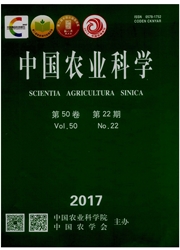

 中文摘要:
中文摘要:
【目的】在华北平原地区,研究前茬小麦耕层水氮调控对后茬玉米土壤深层累积NO3--N的运移及后效的影响。【方法】设置0(N0)、150 kgN.hm-2(N150)两个施氮水平,同时设传统灌溉(W1)和根据土壤水分监测的优化灌溉(W2)两种方式,采用15N微区注射技术,布置田间微区试验,将15N标记于110 cm土层。【结果】在该试验条件下,小麦收获后标记15N在土壤中总体残留趋势:N0W2〈N150W2〈N150W1〈N0W1,且发生垂直运移,上移30 cm,下移50 cm,除N0W2处理外,其余处理累积峰较标记位置下移30 cm;玉米收获后,15N主要分布在100—160 cm土层,与前茬比较峰值未出现下移,其中N0W1处理15N残留量明显减少;玉米对前茬残留的深层15N的利用率N0W1〉N150W2〉N150W1〉N0W2,依次为:5.5%、2.2%、1.7%和1.5%;玉米地上部生物量及总吸氮量均表现为施氮高于不施氮,优化和传统灌溉处理间差异不显著;玉米根系主要分布在0—20 cm土层,且施氮处理根系比例高于不施氮处理,耕层水氮调控影响后作玉米中下层根系发育,N0W1处理80—150 cm土层根长密度明显高于其它处理。【结论】耕层适度节水减氮有利于后茬作物根系下扎,促进其中下层根系的发育,进而促进其对深层累积NO3--N的吸收利用;耕层供氮及传统灌水加剧了硝态氮在深层的累积,对地下水安全造成威胁。
 英文摘要:
英文摘要:
【Objective】The purpose of this study was to study the effects of topsoil water and nitrogen control on the movement and residual effect of nitrate accumulated in deep soil profile in north China.【Method】The injection technique of labeled NO3--N was adopted in a field micro-plot experiment.Nitrogen applied at 0 and 150 kgN·hm-2 N and two irrigation modes were designed.The four treatments were N0W1,N0W2,N150W1,N150W2.The labeled NO3--N was injected in 110 cm soil profile.【Result】Under this condition,the distribution of residual amount of 15N in each soil profile after wheat harvest was: N0W2N150W2N150W1N0W1.The labeled 15N moved at vertical distance.It moved 30 cm to the top soil profile and 50 cm to the lower.In addition to N0W2,the other treatments with the cumulative peak position than the mark down 30 cm;After maize harvest,most 15N was detected in 100-160 cm.The residues of 15N of N0W1 reduced significantly;The utilizations of residual 15N by maize were: 5.5%,2.2%,1.7% and 1.5%,and N0W1N150W2N150W1N0W2.Maize roots were distributed in 0-20 cm,and N treatment was higher than non-fertilizer treatment,topsoil water and nitrogen control affected root development in the middle and lower.【Conclusion】Less nitrogen and reasonable water stress promoted the growth of maize roots in subsoil layers which accelerated the absorption of nitrate accumulated in deep soil profile.Nitrogen does not promote the use of maize residue N,nitrogen and traditional irrigation of plow layer will enhance the accumulation of nitrate in the deep,and thus resulting in the security threat to groundwater.
 同期刊论文项目
同期刊论文项目
 同项目期刊论文
同项目期刊论文
 期刊信息
期刊信息
